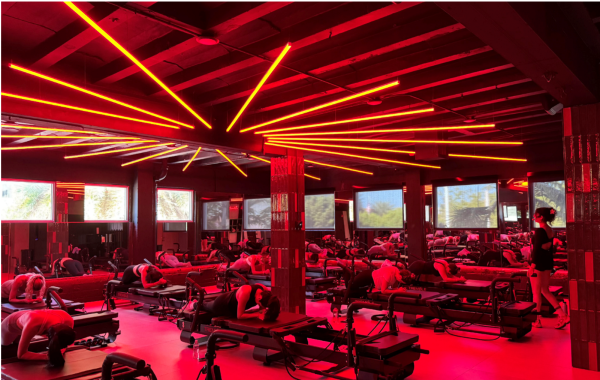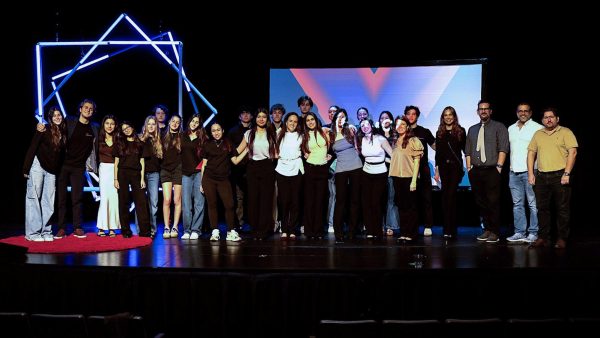Welcome to the Metaverse
Our reporter visits Decentraland, a virtual world powered by Blockchain technology.
With the development of social media platforms such as Facebook, Instagram, Snapchat, and TikTok over the past decade, the number of human-to-human interactions on the Internet has boomed. Amidst the pandemic, not only has social media become necessary to interact with friends and family, but new platforms like Zoom and Google Meet have become integral elements of everyday life.
For many, however, the pandemic has demonstrated the limitations of digital interactions as much as it has forced us to rely on them. It has proven that, as History and Economics teacher Dr. Brandon King put it, our interactions online cannot replace the “body language, the smiling, the eye-rolling… the non-verbal communication and creativity that makes us human.”
At least, not yet.
Enter the metaverse, a ubiquitous buzzword and transformational concept that tech companies are touting as the way for humans to build upon the shortcomings of our current technology. Simply put, the metaverse is a physically embodied and immersive digital world on the Internet in which humans can simulate real-life experiences virtually.
To senior Gideon Shaked ’22, a proponent of the concept, it represents “our natural progression towards Web 3.0— humanity’s greatest jump in human-to-computer interaction since Apple unveiled the iPhone in 2007.”
In games like ‘World of Warcraft,’ ‘Roblox’ and ‘Fortnite,’ primitive and popular forms of the concept of a metaverse already exist. Humans, in the form of avatars, have social interactions with each other in a shared digital space, often exchanging tokens like Robux and VBucks. Most recently, ‘Fortnite’ has transformed the entertainment world by hosting a series of live, virtual concerts in-game for some of the world’s most famous performers, including Travis Scott, Marshmello and Ariana Grande.
As Facebook (now Meta) CEO Mark Zuckerberg announced in his October keynote, however, the concept extends far beyond entertainment and gaming and into all aspects of everyday life. As Shaked ’22 explained, “Nobody knows what the metaverse looks like yet. But the idea is that, like in the movie and book ‘Ready Player One,’ you can meet your friends and family, go to school, shop or even work, making current digital interactions more convenient and even richer.”
Meta has even invested heavily in bringing the metaverse to education (or rather, bringing education into the metaverse). The company announced an initial investment of $150 million in projects aimed to “transform the way we learn,” including virtual learning spaces on Coursera and EdX.
The company is also working on launching their beta-product VR meeting software, Horizon Workrooms, which will be a “game-changer in the workforce and education” according to Dr. King.
“Think of the way we did hybrid and virtual learning last year, right? The metaverse completely transforms that learning into something far more beneficial, not just for me but for you all as well. There is no doubt we will embrace this technology for the sake of synergy,” he said.
At the same time, many are skeptical that Facebook and Microsoft (which announced their own metaverse-like office space) will be able to make 3D realms like Horizon Worlds sufficiently effective and appealing in a short period of time, given the current state of AR and VR technology.
Citing examples like Google Glass, Microsoft Hololens, and even Facebook’s Oculus Quest 2, Shaked said that these companies “must bring the price down considerably to target consumers” and make the tech more user-friendly. “Nobody wants to go to work by strapping on a pair of goggles, holding a weird pair of controllers, and having to set up cameras. Nobody wants to do that.”
Even without VR or AR, however, metaverse-like virtual spaces have been gaining in popularity. Dr. King cited Decentraland, a virtual world powered by blockchain technology in which users use cryptocurrency and non-fungible tokens (NFTs) to exchange digital goods.

Other realms like The Sandbox and Axie Infinity offer similar experiences. “I think the metaverse was big for someone like me to be a believer in the potential of NFTs. Before I was like, we’re talking about Beanie Babies or baseball cards. But now I see a whole world of potential for it,” said Dr. King.
In his view, the metaverse is the key that will allow NFTs to evolve from art items in digital wallets to digital assets with a sense of utility. “Now, I see the digital space of NFTs as like what physical assets are— an opportunity to make money on the ground of a new industry that is starting up and here to stay and an alternative asset in one’s overall portfolio,” he said.
This value proposition is what has attracted real estate companies such as the Metaverse Group to enter the metaverse, selling virtual billboards, online stores, and museums for artists and fashion brands to advertise their products, including Louis Vuitton, Ralph Lauren, Dolce & Gabbana and Nike.
As Dr. King pointed out, however, we are only in the early phases of this new business. “It’s gonna overshoot, right? When the Internet first became like a thing, there were tons of companies capitalizing on it. Companies, even some Fortune 500 companies, that were trading for lots of money in the early 90s don’t exist at all now. But did the Internet go away? No. It didn’t go away when it crashed,” he said.
What concerns Physics and Data Science teacher Mr. Luis Felipe is that after this market bubble, all the small companies currently working on the metaverse—like user-owned Decentraland—will be crowded out by tech giants like Meta. Despite CEO Mark Zuckerberg reassuring the public in his Keynote that Meta will focus on collaboration with these developers, Mr. Felipe sees a centralized metaverse owned by Facebook as a dystopian, cyberpunk future.
“I don’t see how humans will be interested in an artificial experience when they can have a real one, unless the real one is too bad, like in The Matrix,” Mr. Felipe said. For him, the whole idea of “Meta” is simply a PR stunt that Facebook has used to take their rep out of the spotlight.
In the past few months, the company has been widely condemned for harming the mental health of teenagers, spreading disinformation, and fueling political polarization. As Mr. Felipe put it, “Facebook does not consider the impact that a digital life could have on society. So, I don’t like Facebook. I don’t have any social media whatsoever. I don’t trust the company with my data.”
With the metaverse, Facebook could potentially have even more access to our human data than they currently do under the constraints of competitors such as Apple and Google, giving them the ability to manipulate users’ perception of reality even further.
“Now Facebook is gonna have another entry into billions of people’s lives, from their heart rate to finger tapping to eye movements,” Shaked pointed out.
In an ever-changing world that may soon be dominated by the metaverse, Mr. Felipe has proposed a new course called Advanced Machine Learning to provide students with the tools “necessary to move and look forward into the future.” In light of the new Center for Applied Ethics at RE, he hopes students will keep contemplating the ethical concerns of new tech.
“The metaverse can help a lot of people,” he said. “However, we can also use the metaverse in the wrong way. And we most likely will.”

Gabriel Mora '22 is a Co-Editor in Chief and writer for The Catalyst. He covers news & multimedia content for the newspaper.







